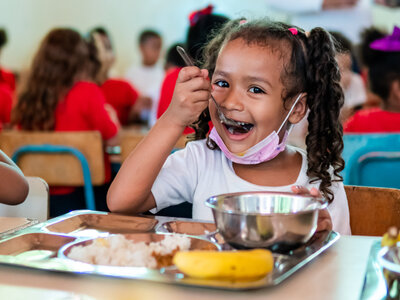Bolivarian Republic of Venezuela
- 40%
- of the population experiencing moderate to severe food insecurity
- 4 million
- people urgently require food assistance
- 29.4 million
- population
The food security situation in Venezuela remains critical, with 15 percent of the total population (around 4 million people) urgently needing food assistance.
A total of 40 percent of the population are experiencing moderate to severe food insecurity.
Access to good quality and nutritious food is a challenge for many families. This has been compounded by the impact of global supply-chain disruptions and food-price increases.
The frequency and intensity of climate-related disasters, such as floods, droughts and landslides, further poses a major challenge to agriculture, food production and livelihoods.
The World Food Programme (WFP) is focused on delivering life-saving food assistance to vulnerable populations. To achieve this, we need the support, good will and strong coordination from the Venezuelan authorities.
We provide school meals and support climate risk management, resilience building and the strengthening of food systems infrastructure and logistical capacity. We continue to apply age, gender and diversity lenses throughout all our programmes, including tailored interventions to meet the needs of people with disabilities and of Indigenous communities.
WFP urgently requires additional funding to sustain support for the most vulnerable populations in Venezuela.
What the World Food Programme is doing in Venezuela
-
School meals
-
The healthy growth and development of schoolchildren lies at the heart of WFP’s work in Venezuela. Our school meals programme covers more than 775,000 beneficiaries in more than 2,700 schools, including over 16,000 students with disabilities. The main recipients are children and school personnel. Nutrition education and community-engagement activities are integrated with the school meals programme.
-
Capacity strengthening
-
WFP is working with partners and school staff to strengthen their capacities to ensure that the school meals programme is implemented safely, respecting hygiene measures and humanitarian principles. WFP provides training in these areas to school staff and field partners. Some of these activities are conducted in partnership with the National Institute of Nutrition.
-
Emergency preparedness and response
-
WFP helps to mitigate the impact of climate emergencies that affect food security, by providing emergency-response training to national institutions and strengthening contingency plans at local level. In emergencies, WFP also provides direct food assistance to people, as well as logistical and coordination support to partners.
-
Coordination
-
WFP is leading the Logistics Cluster and co-leading the Food Security Cluster, together with the Food and Agriculture Organization of the United Nations. WFP provides humanitarian partners with access to common services to ensure an effective response during times of crisis, avoid duplication and maximize coordination among partners.
Venezuela (Bolivarian Republic of) news releases
Go to pagePartners and donors
Find out more about the state of food security in Venezuela (Bolivarian Republic of)
Visit the food security analysis pageOperations in Venezuela (Bolivarian Republic of)
Contacts
Office
Avenida Francisco de Miranda, Edificio Parque Ávila, Caracas 1060, Miranda, Venezuela
Venezuela






